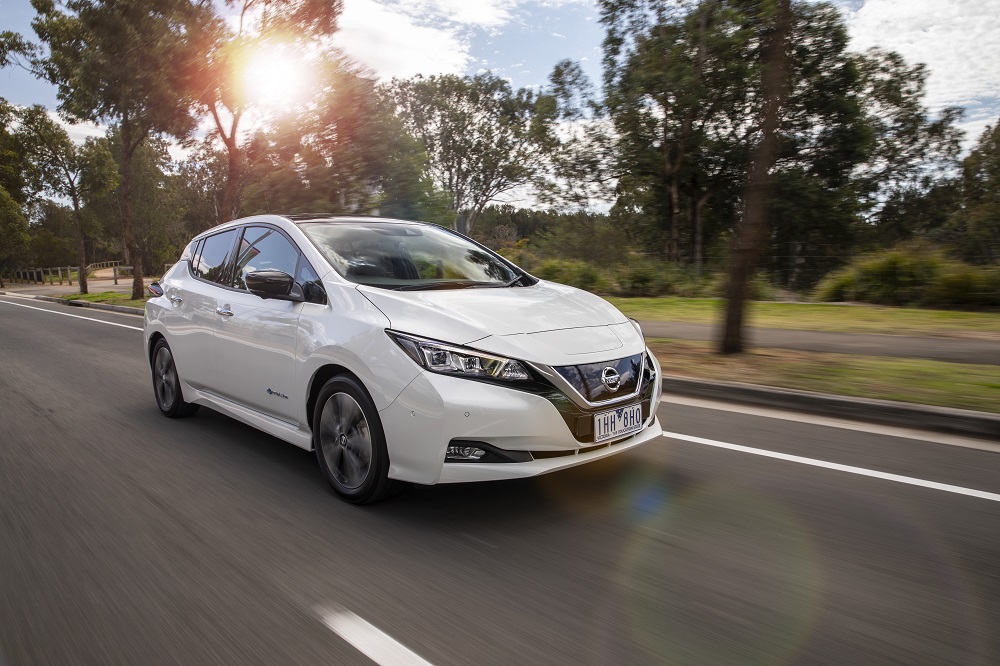UK awards highlight lack of choice in Australia's EV market

Leading UK consumer motoring publication and website WhatCar? has announced the nominees for its inaugural Electric Car Awards, a move that has exposed the glaring lack of choice available for Australian consumers wanting to make the switch to an electric vehicle.
A statement from WhatCar? said the awards were launched following a boom in interest in electrified models from consumers on whatcar.com, and the recent exponential growth in the number of electric vehicles (EV) and plug-in hybrid electric vehicles (PHEV) being launched into the UK, which like Australia is a right-hand drive market.
The awards set out to name the best pure electric models across eight vehicle categories and the best plug-in hybrid models across seven categories, with the total number of 68 individual models across both categories dwarfing what is available to consumers here.
The full list of categories and vehicles is outlined below, with our notation alongside as to whether the vehicle is available in Australia.
Even allowing for the fact that some brands such as Seat and Vauxhall are not sold here, it’s clear that Australian consumers are being left behind in the global rush to embrace EVs and PHEVs.
In stark contrast to the nearly 70 vehicles listed as being available to UK consumers, Australia has just 36 of these models available, or roughly 50% of the EV and PHEV vehicle choices offered to UK consumers.
Last week the chief executive head of Australia’s Electric Vehicle Council (EVC), Behyad Jafari, called on the Federal Government to do more to help drive the transition to EVs and PHEVs in this country.
Speaking in relation to the news that the Federal Chamber of Automotive Industries had unilaterally announced a voluntary industry CO2 standard, Mr Jafari said the door was open for government to implement mandatory emission standards that encourage the best clean vehicles to be made available to Australian consumers.
"The government should follow the (FCAI’s) lead and introduce mandatory standards comparable to the US, the EU, and most other markets,” Mr Jafai said.
“Until this happens we'll just have to accept that a huge proportion of the world's most appealing EVs will be unavailable to Australian consumers.
"Standards need to be designed in a way that encourages automakers to bring their EV models to Australia.
“Australians are early adopters, but they’re missing out on many of the benefits of EVs because our governments have failed to act.”
Less than 3000 EVs found a home in Australia 2019, which while a healthy increase on 2018 sales, was still only a tiny figure when compared with the overall market of 1.06 million new vehicle sales.
So far in 2020 EV sales have recorded modest 6% year-on-year growth, versus a 24% market decline, with year-to-date EV and PHEV sales of 1142 units.
Nominees
WhatCar? Best Electric Car Contenders (available here, yes/no)
Value car
- Seat Mii Electric – No
- Skoda Citigo-e iV– No
- Smart Fortwo EQ – No
- Volkswagen e-Up – No
Small car
- Honda E – No
- Mini Electric ¬¬– Due August 2020
- Peugeot e-208 – No
- Renault Zoe – Yes
- Vauxhall Corsa-e – No
Family car
- Hyundai Ioniq Electric – Yes
- Nissan Leaf – Yes
- Toyota Mirai –No
- Volkswagen e-Golf – No
Family SUV
- DS 3 Crossback E-Tense – No
- Hyundai Kona Electric – Yes
- Kia e-Niro – No
- Kia Soul EV – No
- MG ZS EV – Yes
- Peugeot e-2008 – No
Luxury SUV
- Audi E-tron – Yes
- Audi E-tron Sportback – Yes
- Jaguar I-Pace – Yes
- Mercedes EQC – Yes
Executive car
- Polestar 2 – Due late 2020
- Tesla Model 3 – Yes
- Tesla Model S – Yes
Performance car
- Porsche Taycan – Yes
- Tesla Model 3 Performance – Yes
- Tesla Model S Performance – Yes
Seven-seater
- Tesla Model X – Yes
- Nissan E-NV200 Combi 7st – No
Nominees
WhatCar? Best Hybrid Car Contenders (available here, yes/no)
Family car
- Hyundai Ioniq PHEV – Yes
- Kia XCeed PHEV – No
- Mercedes A-Class A250e – Yes
- Toyota Prius Plug-in – No
Small SUV
- BMW X1 xDrive25e – No
- Kia Niro PHEV – No
- Mini Countryman All4 PHEV – Yes
- Peugeot 3008 Hybrid – No
- Vauxhall Grandland X Hybrid – No
- Volvo XC40 Recharge T5 – Yes
Large SUV
- Audi Q5 55 TFSIe – No
- BMW X3 xDrive30e – No
- Ford Kuga PHEV – No
- Hyundai Nexo – No
- Mercedes GLC 300e – No
- Mercedes GLC Coupe 300e – No
- Mitsubishi Outlander PHEV – Yes
- Volvo XC60 Recharge T8 – Yes
Luxury SUV
- Audi Q7 55/60 TFSIe – No
- BMW X5 xDrive45e – Yes
- Porsche Cayenne E-Hybrid/Turbo S E-Hybrid – Yes
- Porsche Cayenne Coupe E-Hybrid/Turbo S E-Hybrid – Yes
- Range Rover P400e – Yes
- Range Rover Sport P400e – Yes
- Volvo XC90 Recharge T8 – Yes
Estate car
- Volvo V60 Recharge T8 – Yes
- Volvo V90 Recharge T8 – No
- Kia Ceed SW PHEV – No
- Skoda Superb Estate iV – No
- Volkswagen Passat Estate GTE – No
Executive car
- BMW 3 Series 330e – Yes
- BMW 5 Series 530e – Yes
- Mercedes C-Class C300de – No
- Mercedes E-Class E300e – Yes
- Mercedes E-Class E300de – No
- Skoda Superb iV – No
- Volkswagen Passat GTE – No
- Volvo S60 Recharge T8 – Yes
- Volvo S90 Recharge T8 – Yes
Performance car
- BMW i8 – Yes
- Polestar 1 – No
- Porsche Panamera E-Hybrid/ Porsche Panamera Turbo S E-Hybrid – Yes
Related topics
Things to note
The information in this article has been prepared for general information purposes only and is not intended as legal advice or specific advice to any particular person. Any advice contained in the document is general advice, not intended as legal advice or professional advice and does not take into account any person’s particular circumstances. Before acting on anything based on this advice you should consider its appropriateness to you, having regard to your objectives and needs.
Insurance Products (excluding Travel Insurance) are issued by RACQ Insurance Limited ABN 50 009 704 152 (RACQI) and arranged by RACQ Distribution Services Pty Ltd (RDS) ABN 35 116 361 650, AFSL 567130 and RDS' authorised representatives (including RACQ Operations Pty Ltd ABN 80 009 663 414, AR No. 234978 (RACQO)). Conditions, limits and exclusions apply.
Any advice provided by RDS and RACQO is general advice only and does not take into account your personal objectives, financial situation or needs and you will need to consider whether the advice is appropriate for you. Read the Product Disclosure Statement (PDS) before making a purchase decision on the product. You can also access our Target Market Determinations on this website.
RDS receives a commission from RACQI for the policies it arranges. RACQO receives fees paid for services it provides to RDS. Further details about remuneration are available on request prior to purchasing.
Banking and loan products issued by Members Banking Group Limited ABN 83 087 651 054 AFSL/Australian credit licence 241195 trading as RACQ Bank. Terms, conditions, fees, charges and lending policies apply. This is general advice only and may not be right for you. This information does not take your personal objectives, circumstances or needs into account. Read the disclosure documents for your selected product or service, including the Financial Services Guide and the Terms and Conditions, and consider if appropriate for you before deciding.
Except for RACQ Bank, any RACQ entity referred to on this page is not an authorised deposit-taking institution for the purposes of the Banking Act 1959 (Cth). That entity’s obligations do not represent deposits or other liabilities of RACQ Bank. RACQ Bank does not guarantee or otherwise provide assurance in respect of the obligations of that entity, unless noted otherwise.
RACQ Bank subscribes to the Customer Owned Banking Code of Practice which establishes higher standards than the law requires. The Code reflects modern consumer expectations and developments in approaches to issues such as consumer vulnerability, guarantors, and supporting customers through financial hardship. Please read our Customer Owned Banking Code of Practice page for more information.
RACQ Operations Pty Ltd (ABN 80 009 663 414 AR 000234978) and Members Travel Group Pty Ltd (ABN 45 144 538 803 AR 000432492) are acting as an Authorised Representative of the issuer of the insurance, Tokio Marine & Nichido Fire Insurance Co., Ltd. (ABN 80 000 438 291 AFSL 246 548). Any advice set out above is general in nature only, and does not take into account your objectives, financial situation or needs. Before purchasing any travel products, please consider the RACQ Travel Insurance Product Disclosure Statement (PDS) and the Target Market Determinations (TMDs) that apply to these products. Whilst the PDS outlines the Terms and Conditions of these products, the TMDs outline the intended class of customers that comprise the target market for these travel products. This will allow you to consider which products best suit your objectives, financial situation and needs and consider the products appropriateness to your personal circumstances. TMDs also outline matters involving the distribution and the review of these products. The PDS, Supplementary PDS and TMDs for each travel product can be found here.

